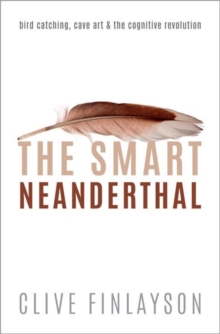Description
| Product ID: | 9780198797531 |
| Product Form: | Paperback / softback |
| Country of Manufacture: | GB |
| Title: | The Smart Neanderthal |
| Subtitle: | Bird catching, Cave Art, and the Cognitive Revolution |
| Authors: | Author: Clive Finlayson |
| Page Count: | 240 |
| Subjects: | History of art, Art of indigenous peoples, Archaeology, Anthropology, Popular science, Evolution, Evolutionary anthropology / Human evolution, Archaeology, Anthropology, Popular science, Evolution, Early man, Prehistory |
| Description: | Select Guide Rating Evidence that Neanderthals caught birds and used their feathers for decoration, along with recent discoveries of Neanderthal cave art, are challenging our preconceptions of the cognitive gap between Neanderthals and modern humans. Clive Finlayson draws on new evidence to overturn the old image of the Neanderthal, and our relationship with them. Since the late 1980s the dominant theory of human origins has been that a ''cognitive revolution'' (C.50,000 years ago) led to the advent of our species, Homo sapiens. As a result of this revolution our species spread and eventually replaced all existing archaic Homo species, ultimately leading to the superiority of modern humans.Or so we thought.As Clive Finlayson explains, the latest advances in genetics prove that there was significant interbreeding between Modern Humans and the Neanderthals. All non-Africans today carry some Neanderthal genes. We have also discovered aspects of Neanderthal behaviour that indicate that they were not cognitively inferior to modern humans, as we once thought, and in fact had their own rituals and art. Finlayson, who is at the forefront of this research, recounts the discoveries of his team, providing evidence that Neanderthals caught birds of prey, and used their feathers for symbolic purposes. There is also evidence that Neanderthals practised other forms of art, as the recently discovered engravings in Gorham''s Cave Gibraltar indicate.Linking all the recent evidence, The Smart Neanderthal casts a new light on the Neanderthals and the "Cognitive Revolution". Finlayson argues that there was no revolution and, instead, modern behaviour arose gradually and independently among different populations of Modern Humans and Neanderthals. Some practices were even adopted by Modern Humans from the Neanderthals. Finlayson overturns classic narratives of human origins, and raises important questions about who we really are. |
| Imprint Name: | Oxford University Press |
| Publisher Name: | Oxford University Press |
| Country of Publication: | GB |
| Publishing Date: | 2021-10-12 |


